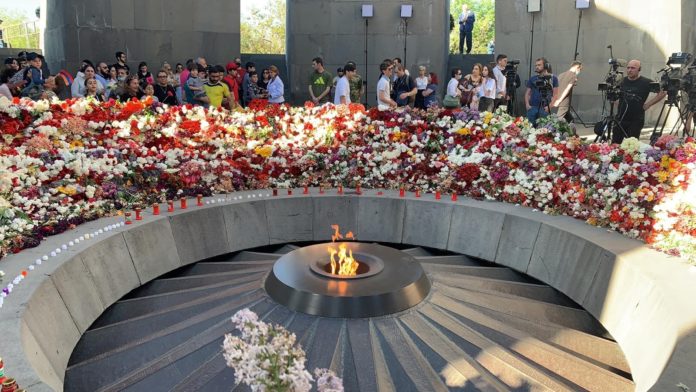YEREVAN – The traditional Armenian Genocide commemoration felt bittersweet for the hundreds of thousands of Armenians making the pilgrimage to the Tsitsernakarberd memorial on Saturday, April 24. In the wake of last autumn’s major military setback against the Turkish-supported Azerbaijani Army, the subsequent ethnic cleansings which have effectively ended millennia of continuous Armenian habitation in the Artsakh towns of Hadrut, Shushi and Talish have evoked memories and long-buried trauma of the 106=year-old Genocide.
Still, for those concerned that the indigenous Armenian people’s presence in the South Caucasus may yet again be under threat, a proclamation by US President Joe Biden has injected new hope that a newly-reengaged United States on the world stage would be more willing to support Armenia as it faces renewed threats in the region. Still, as the political consultant Eric Hacopian noted in a recent interview with Civilnet, the Biden Administration’s recognition is largely about correcting a historical wrong and resulted from decades of successful American-Armenian activism. It doesn’t directly signal renewed American interest in the modern Caucasus however.
“Each year on this day, we remember the lives of all those who died in the Ottoman-era Armenian genocide and recommit ourselves to preventing such an atrocity from ever again occurring” read Biden’s proclamation, which reached Yerevan at 8:00 PM local time. Audible outbursts of cheers were set off across the Armenian capital as the news continued to spread, and more Armenian television channels interrupted regular programming to break the historic story.
“For the first time ever, I’m going to pop open a beer on April 24th” one cheerful passerby told the Mirror-Spectator. “This is no longer a commemoration of our losses, but a celebration of our ultimate victory: survival.”
The statement was also welcomed by Armenian Prime Minister Nikol Pashinyan. The prime minister, who had been attending a final concert of the Trilogy of Remembrance, dedicated to the 106th anniversary of the Armenian Genocide with his wife, reportedly sent President Biden a letter expressing gratitude for his act. It was also met with a barrage of criticism from Ankara and Baku.
Pashinyan hailed Biden’s statement as a “a powerful step on the way to acknowledging the truth,” and bring justice to the victims of the Genocide and their descendants. He also thanked the American President for setting an “inspiring example” for those hoping to see a just and tolerant world.








